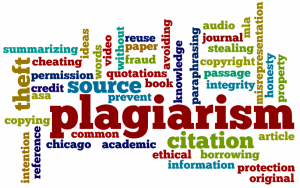Plagiarism Research Paper
“Intellectual property” and “academic integrity” we can often see in Western classes or article. Nonetheless, it is always misty for the foreign student who come from developing country which is not attached enough importance to this kind of area than Western country, because they are not seriously required to focus on it. Meanwhile, when we see the words about “plagiarism”, we know they are wrong and we should not do it. However, it is hard for some people to avoid, since they do not have an accurate definition for it. Many scholars have similar definitions of plagiarism such as Badke’s, which he defines as  “Plagiarism can be defined as using another writer’s words or unique ideas as if they were your own.” Hjortshoj (2009) also defined it as stolen the other people’s “brainchild”. Hence, due to the fact that these factors would have plenty of problem for our future discipline study in the Western country, we should pay more attention to “intellectual property”, “academic integrity” and avoid “plagiarism” in the future study.
“Plagiarism can be defined as using another writer’s words or unique ideas as if they were your own.” Hjortshoj (2009) also defined it as stolen the other people’s “brainchild”. Hence, due to the fact that these factors would have plenty of problem for our future discipline study in the Western country, we should pay more attention to “intellectual property”, “academic integrity” and avoid “plagiarism” in the future study.
In western country, the academic integrity is important. Because first, the research work is fundamental for the other people’s reliance. Second, it would reduce the passion of youngest science. Third, it would make a negative influence for public (Swazey, 1998). Especially in the accounting area, we need to pay more attention to this problem than other major. Because the accountant needs more justice than the other job. Many accounting departments in UK universities have included ethics-related modules into their curriculum design (Ghaffari, Kyriacou, and Brennan, 2008). In China, some individuals do not pay much attention to the “intellectual property” and “academic integrity” problem. Although the government and related personal try their best to reduce the illegal downloading and plagiarism behavior, there are also many people believe they are not wrong. In the mean time, in some high education school, they ignore these problems too. Due to the fact that Chinese university has more student than Western country, the professor could not keep an eye on every student. Thus, they always just lay emphasis on does the student has a good result. Although there are some tools for detecting plagiarism like Safe Assign and Turn-it-in, the student still lacks the awareness with “intellectual property” and “academic integrity”. All of these reasons, led to a part of Chinese lack the knowledge about “intellectual property” and “academic integrity”. Moreover, as we can see, China is a rapidly developing country, but in some way, the citizen cannot keep the scholarly attainment or ideology with the speed of developing. For instance, even though the China is a power country and has many high technologies, there are few people achieve the Nobel prize or other prizes like it. The reason could be the Chinese do not have enough innovative thinking and intellectual property thinking. Therefore, the awareness of “intellectual property” and “academic integrity” is also a cornerstone of the countries.
There are several of the incidents which can be regarded as plagiarism. For example, intentionally use the other’s work as your own achievement without quotation or paraphrase. Using the achievement or idea without the partner’s permit. Due to the fact that more citations were used, it is easy to lack their own or new statement when they write the article, because they would only follow the prior study result. (Hjortshoj, 2009; Badke,2003). Furthermore, there are pieces of advice which can help us to avoid plagiarism. First, do not copy without quotation. You can paraphrase and use your own language to explain (Ober, 2013). Second, do not use your old image, table or text without cited, even though it wrote by yourself (Ober, 2013). Third, getting an agreement when you use the other’s works (Ober, 2013). Last, looking for other people to double check or use the application to check your article (Syed, 2013). If we pay more attention to these pieces of advice, we could avert most of the plagiarisms.
All in all, whatever the occupation we are, we should always focus on the plagiarism problem. It is not only the scholar should not do, but also the ordinary being. Only correct citation and bring forth new ideas can be a positive step forward. (Words 700)
Reference list
Hjortshoj, K. (2009). Theft, fraud, and the loss of voice. The transition to college writing. (Pp.172-184). New York: Bedford/St. Martin’s Press.
Badke, W. B. (2003). Beyond the Answer Sheet: Academic Success for International students. New York: iUniverse.
Swazey, J. P. (1998). Research integrity: Why it matters. Forum for Applied Research and Public Policy, 13(1), 61-64.
Ober, H. (2013). Five Simple Rules to Avoid Plagiarism. Annals of biomedical engineering. 41 (1), p. 1 – 2.
Syed, W. (2013). Simple steps to avoid plagiarism and improve scientific writing. Libyan journal of medicine. 8 (0), p. 21825.
Ghaffari, F., Kyriacou, O. and Brennan, R. (2008) Exploring the implementation of ethics in UK accounting programs, Issues in Accounting Education, 23(2), pp. 183–198.
